English language knowledge as a determinant of employability in hotel industry – The case of Vrnjačka Banja, Serbia
DOI:
https://doi.org/10.5937/menhottur2201125PKeywords:
English language knowledge, hotel industry, needs analysis, employabilityAbstract
English has become widely accepted as the language of hotel industry and one of the core soft skills of employability. Since the perceptions of different stakeholders in education often differ to a certain extent, when designing a language course at a university level, it is of utmost importance to take into consideration the opinion of industry practitioners. The aim of the present diagnostic quantitative study employing case study methodology is to look into the importance of English language knowledge for employability in the hotel industry, define field-specific foreign language needs and identify the problems faced in supplier-consumer encounters. The obtained results point to the fact that hotel employees find English important for successful performance. The most necessary skills proved to be speaking and listening comprehension, followed by writing and reading. The identified problems faced in communication were related to inability to understand the interlocutor and the lack of proper lexical knowledge.
Downloads
References
Amiradis, Ch. (2011). Die fachsprache des tourismus: Charakteristika und anwendungsbereiche [The language of tourism: Characteristics and areas of application]. Zeitschrift für die Regionale Wissenschaft [Journal of Regional Science], 2(2), 57–73.
Blue, G. M., & Harun, M. (2003). Hospitality language as a professional skill. English for Specific Purposes, 22, 73–91. https://doi.org/10.1016/S0889-4906(01)00031-X
Clarke, M. (2017). Rethinking graduate employability: The role of capital, individual attributes and context. Studies in Higher Education, 43(11), 1923–1937. https://doi.org/10.1080/03075079.2017.1294152
Crossman, J. E., & Clarke, M. (2010). International experience and graduate employability: Stakeholder perceptions on the connection. Higher Education, 59(5), 599–613. http://doi.org/10.1007/s10734-009-9268-z
European Commission. (2008). Languages mean business – Companies work better with languages. Luxembourg: Office for Official Publications of the European Communities. Retrieved December 24, 2021 from https://education.gov.mt/en/foreignlanguages/Documents/EC%202008%20Languages%20Mean%20Business.pdf
European Commission. (2012). Report on language competences for employability, mobility and growth. Strasbourg. Retrieved December 24, 2021 from https://eur-lex.europa.eu/legal-content/EN/TXT/?uri=celex:52012SC0372
European Commission. (2020). Languages for Jobs. Providing multilingual communication skills for the labour market. Retrieved December 24, 2021 from https://ec.europa.eu/assets/eac/languages/policy/strategic-framework/documents/languages-for-jobs-report_en.pdf
Hieu, D. M., & Cheng, Y. H. (2021). Needs analysis of hotel front desk staff: Considerations for ESP course design. International Journal of English for Specific Purposes, 1(1), 69–92.
Hurrell, S. A. (2016). Rethinking the soft skills deficit blame game: Employers, skills withdrawal and the reporting of soft skills gaps. Human Relations, 69(3), 605–628. http://dx.doi.org/10.1177/0018726715591636
Kay, C., & Russette, J. (2000). Hospitality-management Competencies: Identifying managers’ essential skills. Cornell Hotel and Restaurant Administration Quarterly, 41(2), 52–63. https://doi.org/10.1177/001088040004100217
Kostić-Bobanović, M., & Bobanović, M. (2013). Foreign language skills in business communication. In Z. Balantić et al. (Eds.). Smart Organisation. High potentials, Lean organisations, Internet of things (pp. 415–422). Portorož, Slovenia: Faculty of Organisational Science.
Luka, I. (2015). Enhancing employability skills for tourism and hospitality industry employees in Europe. Acta Prosperitatis, 6, 75–94.
Martin, A., & Davies, S. (2006). An evaluation of the language skills in Scottish hotels. Journal of Hospitality, Leisure, Sport and Tourism Education, 5(1), 4–15. https://doi.org/10.3794/johlste.51.94
Namtapi, I. (2022). Needs analysis of English for specific purposes for tourism personnel in Ayutthaya. LEARN Journal: Language Education and Acquisition Research Network, 15(1), 409–439.
Pešić, D. (2017). Needs analysis as the basis of ESP curriculum design in tourism studies. Menadžment u hotelijerstvu i turizmu – Hotel and Tourism Management, 5(2), 36–50.
Pešić, D., & Radovanović, A. (2016). The EL knowledge as a means of enhancing business performance in tourism and hospitality - students' perceptions. In D. Cvijanović et al. (Eds.) Tourism in Function of Development of the Republic of Serbia – Spa Tourism in Serbia and Experiences of Other Countries (pp. 586–602). Vrnjačka Banja: University of Kragujevac, Faculty of Hotel Management and Tourism in Vrnjačka Banja.
Prachanant, N. (2012). Needs analysis on English language use in tourism industry. Procedia – Social and Behavioral Sciences, 66, 117–125. https://doi.org/10.1016/j.sbspro.2012.11.253
Rahayu, N. (2020). Has English at tourism and hospitality higher education met the future workplace requirements? In N. Haristiani et al. (Eds.). Proceedings of the 4th International Conference on Language, Literature, Culture, and Education (ICOLLITE 2020), Vol. 509 (pp. 506–513). Pendidikan, Indonesia: Faculty of Language and Literature Eucation. http://dx.doi.org/10.2991/assehr.k.201215.079
Statistical Office of the Republic of Serbia (2020). Statistical Yearbook of the Republic of Serbia. Belgrade.
Vuković Vojnović, D., & Jerković, J. (2018). The writing skill needs analysis in a professional context: A case study of hotel employees. In P. Vi?i? et al. (Eds.). The Importance of Learning Professional Foreign Languages for Communication between Cultures (pp. 397–406). Celje, Slovenia: University of Maribor Press. https://doi.org/10.18690/978-961-286-252-7.30
Published
How to Cite
Issue
Section
License
Copyright (c) 2022 Dragana Peši?

This work is licensed under a Creative Commons Attribution 4.0 International License.







